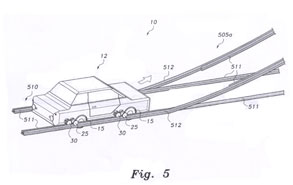Technology
Click here for our introductory white paper
Section Links: Technology | Requirements
BiModal Glideway Elements
Glideway
- STRUCTURE: single lane modular concrete and steel pylons with parallel beams on top
- ROADBED: steel rails embedded in beams protected by weather deflectors
- SWITCHES: vertical, static ramps rise from grade level which blend into main line rails
- CONTROLS: all electric, computerized, fail safe, redundant, and integrated into bimodal vehicles
- POWER: provided to vehicles through glideway rails
- THROUGHPUT: max at 120 mph and 40 ft space per vehicle is 15,840 vehicles/hour
- COMMUNICATION: Through passive bar codes and or radio frequency identification (RFID) in glideway and active scanner in vehicles
Vehicles
- OPERATION: all electric, elevated, and fully automated in glideway mode
- MODES: conventional auto for conventional roadways and bimodal for glideway travel
- PRODUCTION: auto industry designed, produced and marketed bimodal vehicles incorporating bimodal sub-systems produced under strict government oversight
- CONTROLS: all electric for bimodal operations determining vehicle speed, location, acceleration, spacing, switching, and monitoring conditions of all systems
- SWITCHING: vehicles enter and exit main line only; no transfers and no changing lanes; vehicle controls active switching by extending suspension system from its sides at predetermined locations; all transfers made at street level
- TRANSPORT: personal, privately owned bimodal system and a commercial system which includes: rentals, commercial, industrial, cargo bimodals plus a driverless automated bimodal stripped of all automobile features for shuttling between exclusive terminals for mail, UPS, industries, freight, and mass transit stations
- POWER: electricity transmitted from a third rail in glideway by pantographs/shoes
- BRAKING: automatic and regenerative coupled with hydraulic back-up
- STEEP TERRAIN: cog-rail on separate slower secondary lines
- SAFETY: all critical systems are redundant, fail-safe and self-tested at every on-ramp; vehicles ride between concrete beams at a constant velocity
- STORAGE: automated delivery and retrieval to vertical high density parking structures
- NON-POLLUTING: no rubber, exhaust, oil, or hydrocarbons
- RELIABILITY: depends on testing, critical parts, redundancy and inter-active control
- COMMUNICATION: All vehicles maintain emergency communications with a central bimodal communications center
- PROPULSION: Electric rotary motors (air or liquid cooled, single or multiple) in competition with linear motors and magnetic levitation. In consideration are air bearings/cushions given the relatively light weight and aerodynamic potentials of the vehicles
Economics
- VEHICLES: purchased by individuals and businesses
- BILLINGS: energy use billed monthly through electric utility companies for power used on the glideway. This includes glideway maintenance operating expenses, future expansions, etc.
- INFRASTRUCTURES: financed by long term federal and state loans repaid taxes on the electric power used by the system. The glideway requires minimum ground area and rights-of-way. On-off ramps are spaced much further apart than highway ramps (Short distances not practical for high speed glideways.)
- GLIDEWAYS: relatively static with no moving parts. Two elevated parallel beams spaced approximately 6 feet apart bear one or two small steel rails on each beam. No electronics required in the main line. Very cost effective.
- COMMUNICATION: bar codes and/or RFID imprinted in the sides of the glideway and barcode/RFID scanners in vehicles on the glideway maintain instantaneous information such as their precise location on that glideway, speed of travel, preparation for exiting at the desired ramp, etc.
- SAFETY: major reduction in total auto accidents, insurance, repairs; reduction in traffic deaths in thousands per year

From Patent: Personal vehicle about to ascend from the entry track to the main glideway.